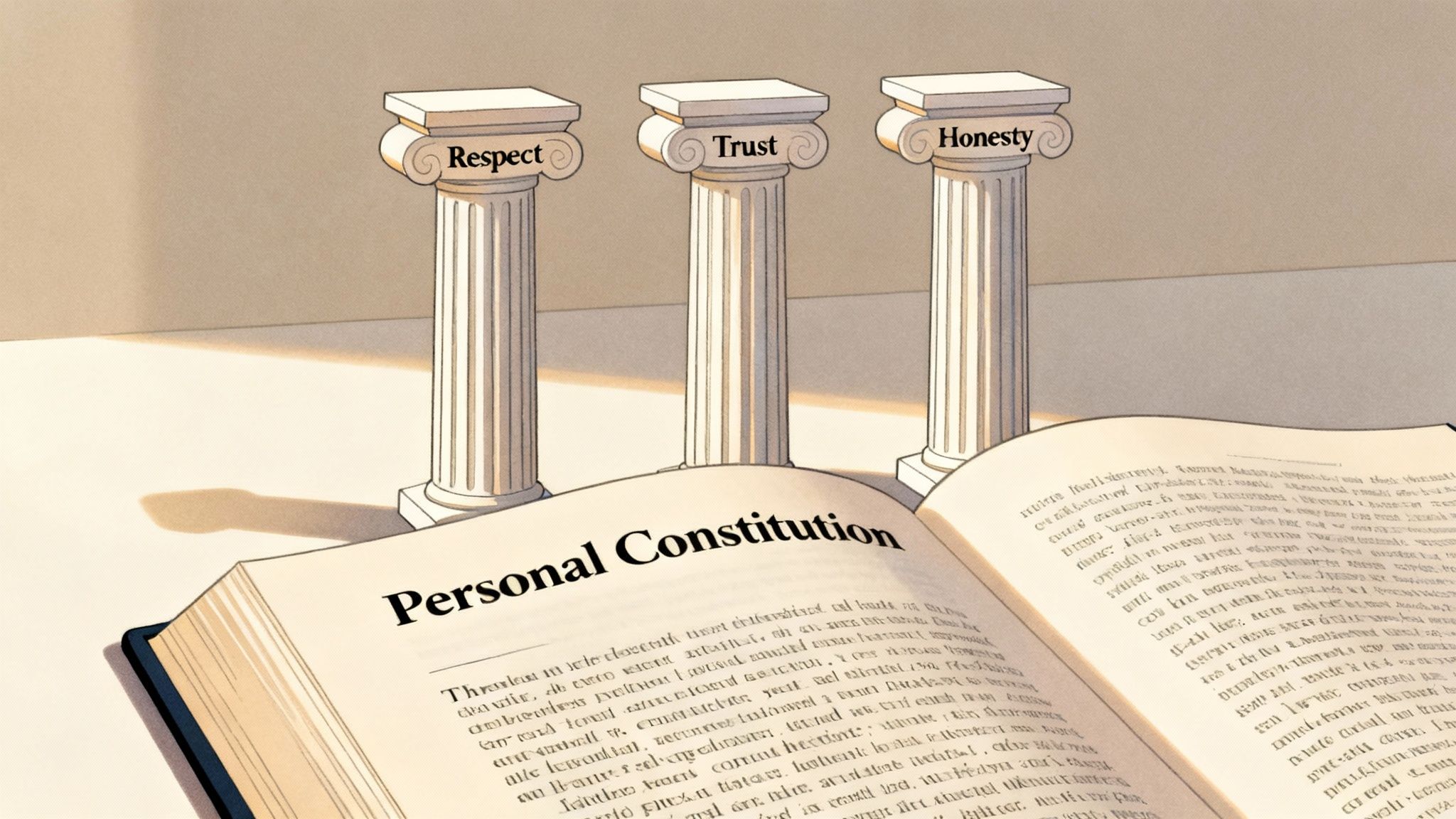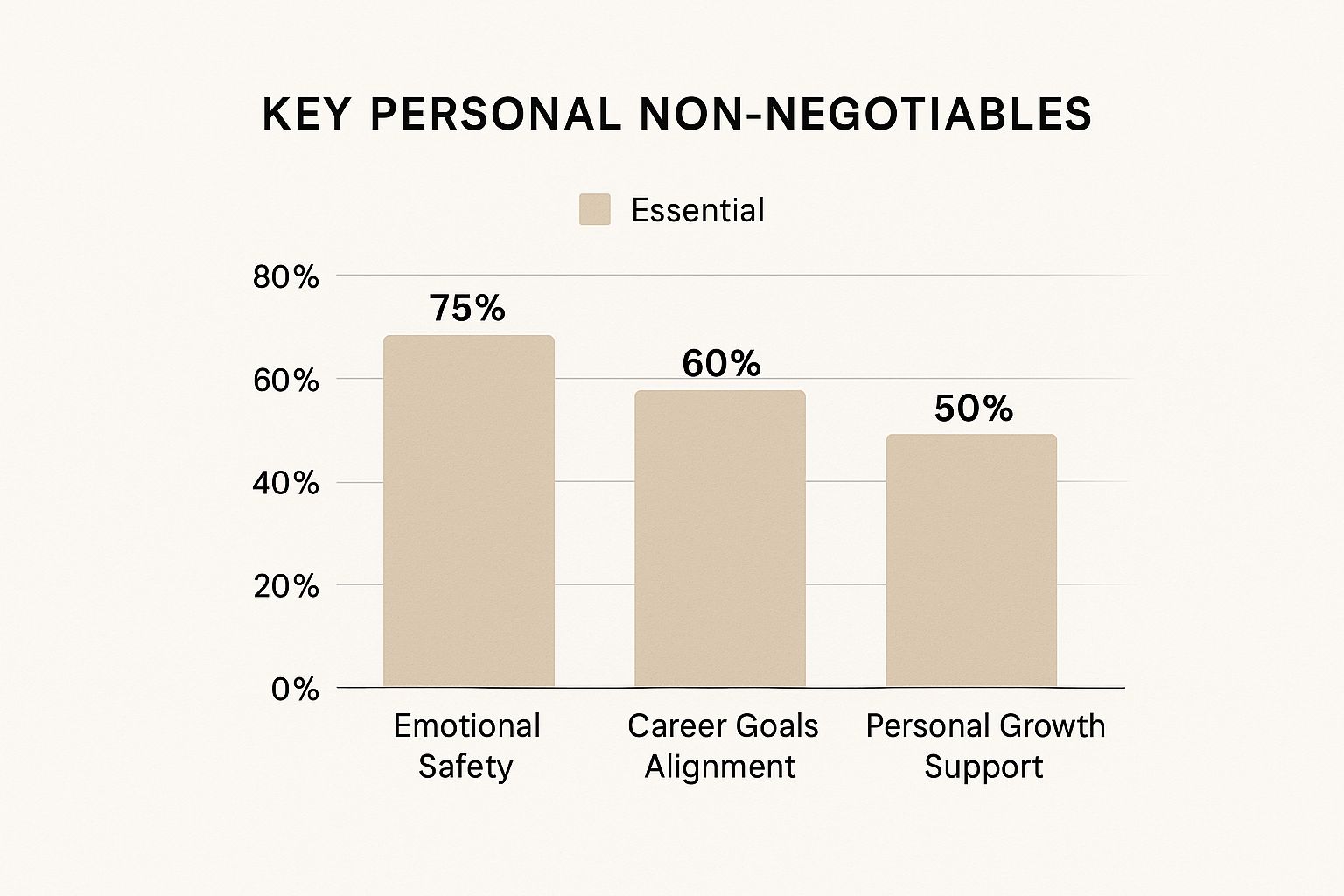Non Negotiables in a Relationship and Why They Matter
- Therapy-with-Ben
- Oct 15, 2025
- 11 min read
When we talk about non-negotiables in a relationship, what we're really getting at are the absolute core values and boundaries that you need to feel safe, respected, and whole. They aren’t a list of demands or a way to control your partner. Instead, think of them as the foundational pillars of the partnership you’re building.
What Are Relationship Non-Negotiables?

A good way to picture your non-negotiables in a relationship is to see them as your personal constitution. They're the fundamental principles—like mutual respect, honesty, or emotional safety—that you simply can't compromise on without feeling like you’ve lost a bit of yourself in the process.
These core requirements are deeply personal and look different for everyone. What’s an absolute deal-breaker for you might just be a minor preference for someone else. The point isn’t about being difficult; it's about honouring what you genuinely need to feel secure in a connection.
The Foundation of a Healthy Partnership
Getting a handle on these principles is the first real step toward building a partnership that’s not just sustainable but genuinely loving. To really understand why they matter so much, it helps to look at the broader landscape of healthy relationships first. Without that clarity, it’s all too easy to build a connection on shaky ground, which almost always leads to resentment and conflict down the line.
Think of your non-negotiables as the unshakeable anchors in the sometimes-stormy seas of a relationship. They keep you grounded in your values and prevent you from drifting into situations that compromise your well-being.
Recent research really drives home just how vital these values are. A 2019 YouGov survey of UK adults found that a massive 62% of people considered 'trust' their top non-negotiable. This was followed closely by honesty (51%) and communication (46%), showing a clear consensus on these foundational elements.
Ultimately, identifying and sticking to your non-negotiables is about looking after yourself. It allows you to:
Protect your emotional well-being: It ensures your core needs for safety and respect are always being met.
Foster genuine compatibility: This helps you build a connection based on shared fundamental values, not just fleeting chemistry.
Communicate your needs clearly: It sets the stage for open, honest conversations with your partner right from the beginning.
Why Every Relationship Needs Non Negotiables
Figuring out your non-negotiables is one of the most proactive things you can do for yourself and your relationship. Far from being restrictive, think of these as a shared compass pointing you both in the same direction, helping you navigate life's inevitable storms.
When you hit a rough patch or a difficult decision, these core principles are what you fall back on. Knowing what’s fundamentally important to each other creates a powerful foundation of mutual respect and emotional safety.
This kind of clarity is what stops resentment from quietly building up in the background. Without it, even the strongest connections can get worn down by having the same arguments over and over again about things that really matter.
Building a Foundation of Trust
Setting out your non-negotiables in a relationship is about consciously building a future on values that actually line up. It's the difference between being in love with an idea of someone and knowing you're truly compatible where it counts.
This is a huge part of creating real, deep trust. In fact, it complements many of the ideas we cover in our guide on how to build trust in relationships.
Getting this wrong isn't just a minor issue; it has real-world consequences. Data from the UK's Office for National Statistics in 2022 showed that basic incompatibility is a major reason couples separate. In fact, an inability to agree on core issues was mentioned in over 60% of these cases. It really highlights the importance of what some call the unbreakable rules for married couples.
By honouring your non-negotiables, you are not just setting rules; you are actively choosing to build a relationship that supports your well-being and allows both partners to flourish authentically.
Ultimately, these principles give a relationship the structure it needs to feel secure and stable. They create a safe space where you can both be honest and vulnerable, knowing your core needs will be respected. That's the bedrock of a connection that isn't just loving, but resilient too.
How to Identify Your Personal Non-Negotiables

Figuring out your non-negotiables isn’t something that happens overnight. It’s a bit like detective work, requiring some honest self-reflection to turn those vague, nagging feelings into a clear personal framework you can actually lean on.
A really powerful place to start is your own history. Think back over your past relationships – not just the romantic ones, but friendships too. Pinpoint the moments where you felt the most drained, disrespected, or just completely unseen.
What were the recurring arguments or themes that consistently left you feeling hurt? These painful patterns are often bright, flashing signs pointing directly to where your fundamental needs weren't being met.
It’s also crucial to think about what makes you feel safe. Our earliest experiences have a massive impact on how we view safety and connection, which ties into the fascinating links between attachment styles and their interaction with self-worth. Getting clear on your needs for both emotional and physical safety is a cornerstone of this process.
Reflect on Your Future and Core Values
Your non-negotiables are also deeply woven into your vision for your life. Where do you honestly see yourself in five or ten years? Think about your ambitions for your career, family, personal growth, and the kind of lifestyle you want.
A partner doesn't need to have the exact same goals, but their path can't be fundamentally at odds with yours. For this to work, your directions need to be compatible.
To get a real handle on this, it's incredibly helpful to first define your core values. It's a similar process to writing a personal mission statement, and it forces you to dig deep and get crystal clear on what truly matters to you, beneath everything else.
A non-negotiable isn’t just a preference; it’s a standard that protects your well-being and honours your vision for your own life. When a relationship requires you to sacrifice a core value, it’s a sign of fundamental incompatibility.
To bring this out of the abstract and into the real world, try asking yourself these questions:
What specific behaviours from a partner would make you feel fundamentally disrespected?
How important is financial stability, and what does that actually look like for you in practical terms?
Do you need a partner who is genuinely committed to personal growth and self-awareness?
When you’re facing a tough time, what does a truly supportive partnership look like?
Answering these honestly helps you build a concrete list of your non-negotiables in a relationship. This isn't about creating a rigid checklist to judge people against. It's about understanding yourself deeply enough to build a partnership that genuinely nurtures you.
By Therapy-with-Ben
Examples of Common Relationship Non Negotiables
So, what do these non negotiables in a relationship actually look like in the real world? It's one thing to talk about them as a concept, but seeing them in practice makes everything much clearer. They aren’t just vague ideas; they're the solid, practical things you need to feel safe and fulfilled with someone.
Your non negotiables will be deeply personal, but they often touch on the big stuff: emotional safety, the direction you want your life to go, and your core beliefs. For instance, a non negotiable might be needing a partner who genuinely champions your career goals, or it could be that you both have to be on the same page about wanting (or not wanting) children.
This infographic gives a fascinating glimpse into how important certain non negotiables are to people when building a healthy partnership.

As you can see, emotional safety is a massive one for most people. It really highlights how it serves as the bedrock for any meaningful connection.
Core Values and Life Goals
This is where we get into the big-picture stuff. When your core values or major life goals clash with a partner's, it often signals a fundamental incompatibility that simple compromise can't fix.
Here are a few examples:
Family Aspirations: One person is absolutely certain they want children, while the other is just as certain they don't.
Religious or Spiritual Beliefs: You need a partner who either shares your spiritual path or, at the very least, respects it without judgement.
Personal Integrity: Honesty is a deal-breaker for you. This means you simply can't build a life with someone who is deceptive or lies.
It’s so important to be able to tell the difference between these essentials and your simple preferences. A preference is a "nice-to-have," whereas a non negotiable is a "must-have." Getting the two mixed up is a recipe for compromising on the very things you need for your own happiness.
A preference is flexible; a non negotiable is foundational. Honouring this distinction is an act of self-respect that allows you to build a relationship on solid ground rather than on hope alone.
To make this distinction even clearer, it helps to see some side-by-side comparisons.
Differentiating Non Negotiables from Preferences
The table below breaks down how a core need differs from a flexible preference across different parts of a relationship.
Relationship Area | Example of a Non Negotiable (Deal-Breaker) | Example of a Preference (Area for Compromise) |
|---|---|---|
Financial Habits | My partner must be financially responsible and not get into reckless debt. | I'd prefer it if my partner saved a bit more money each month. |
Social Life | I need a partner who respects my need for alone time and separate friendships. | It would be nice if my partner wanted to hang out with my friends more often. |
Communication | My partner must be willing to talk things through and resolve conflict constructively, without shouting or giving me the silent treatment. | I'd prefer it if my partner texted me more during the day. |
Looking at it this way, you can really see the weight difference. One is about feeling secure and respected; the other is about personal taste. Recognising which is which is a key skill for building a relationship that lasts.
By Therapy-with-Ben
Communicating Your Non-Negotiables With Your Partner

Figuring out your non-negotiables in a relationship is a brilliant personal breakthrough, but the real change happens when you actually share them. This isn't about handing over a list of demands; think of it as an invitation to build a more honest and sturdy partnership, together.
How you approach this chat really matters. The goal is connection, not confrontation. So often, I see couples jump straight into using a technique or strategy they've read about without first making sure they're in a good place. It’s the relationship itself that has to come first.
Setting the Stage for a Constructive Conversation
Timing and tone are everything. You need to pick a moment when you both feel calm and connected, without the kids, the TV, or your phones demanding attention. Trying to have this conversation in the middle of a row is just asking for defensiveness and misunderstanding.
Instead, try framing it positively. You might say something like, “I’ve been thinking a lot about us and our future, and what we both need to feel truly happy. I'd love to share some of my feelings and hear yours as well.” This simple shift sets a collaborative, team-based tone right from the start.
Communicating your non-negotiables is not a one-time event but an ongoing dialogue. It’s a powerful act of connection that demonstrates your commitment to building a relationship where both partners feel seen, heard, and respected.
Using “I” statements is an absolute game-changer here. Rather than saying, “You never support my career,” which will almost certainly put your partner on the back foot, try framing it around your own needs: “For me to be happy in a partnership, I need to feel that my career goals are supported.”
This approach is all about your feelings and what you need, without pointing fingers. It's a fundamental part of learning how to communicate better in relationships and keeps the door open for a genuine, constructive chat.
Creating a Space for Mutual Understanding
Remember, this is a two-way street. After you've shared your thoughts, it's absolutely vital to create a safe space for your partner to open up about their own non-negotiables. This means practising active listening—really hearing them out without just waiting for your turn to speak.
Here are a few ways to help foster that safe space:
Ask open questions: Try things like, “What does that look like for you?” or “Can you tell me a bit more about why that’s so important to you?”
Validate their feelings: You don't have to agree to understand. Simple phrases like, “I can see why you feel that way,” or “That makes sense,” can make all the difference.
Be patient: Give them time to gather their thoughts. This might be a completely new way of talking for them, so don't rush it.
When you treat this conversation as a shared exploration, you transform what could be a difficult moment into a powerful chance to deepen your connection and build lasting mutual respect.
Getting to Grips with Your Relationship Non-Negotiables
So, you've decided to introduce some non-negotiables in a relationship. That’s a massive step, but it often opens up a whole new can of worms. You might be wondering how they'll actually work in the real world, especially if you've been with your partner for years. It's completely normal to feel a bit uncertain.
This section is all about tackling those common worries head-on. Think of it as your practical guide to managing the tricky bits of setting and sticking to these healthy boundaries, with a bit of reassurance thrown in.
Is it too late to set non-negotiables in a long-term relationship?
Absolutely not. While it's always handy to talk about these things early on, it's genuinely never too late to strengthen your partnership and build a deeper connection. In fact, bringing up non-negotiables now shows you’re invested in the relationship's future.
The trick is all in the approach. Come at it gently. You could frame it as a natural part of how you're both growing together, explaining that you want to build an even stronger foundation for whatever comes next.
What if my partner and I have conflicting non-negotiables?
This is a big one, and it's a moment that calls for some serious, open honesty from both of you. First things first, have a chat to make sure you’re both talking about genuine non-negotiables – those core, unshakeable needs – and not just really strong preferences that might have a bit of wiggle room.
If you find a core life goal is in direct conflict, like one of you is absolutely set on having children and the other is just as certain they don't, it’s time for a proper conversation about your long-term compatibility. This isn't about one person being right and the other being wrong; it might just mean your paths are heading in fundamentally different directions. This is exactly the kind of situation where a couples counsellor can be incredibly helpful.
Am I being too picky if I have too many non-negotiables?
There isn't a "correct" number here. Real non-negotiables in a relationship are tied to your core values and what you fundamentally need to feel safe and secure—things like respect, trust, and emotional safety. It’s vital to keep your focus on these 'big picture' items.
If you find your list is getting crowded with minor preferences (like, 'must enjoy the same films as me'), it might be a good idea to separate what is truly essential for your well-being from what would simply be nice to have. The aim is to find someone you're compatible with, not a carbon copy of yourself.
What if my partner dismisses my non-negotiables?
How a partner reacts when you lay out your boundaries tells you a lot. If they consistently brush off your core needs, it could point to a much deeper problem with respect or empathy in the relationship. That's a massive red flag and one you shouldn't ignore.
A healthy partnership is built on mutual respect for each other's fundamental needs. When a partner disregards your non-negotiables, they are essentially telling you that your emotional safety isn't a priority for them.
Try explaining, as calmly as you can, why these things are so important to you. If they still won't hear you, it might be worth considering getting some professional support. A couples therapist can help you navigate this difficult conversation and get to the bottom of the underlying issues.
By Therapy-with-Ben
If you're struggling to figure out or communicate your non-negotiables, or if trying to talk about them just leads to conflict, you don't have to muddle through it on your own. Therapy with Ben offers a supportive, non-judgemental space to explore these challenges and help you build stronger, healthier relationships. Find out more about how counselling can help by visiting https://www.therapy-with-ben.co.uk.









Comments